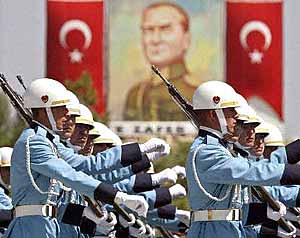October 26, 2007 (the date of publication in Russian)
Alexander Sobko
WILL TURKEY BECOME AN ISLAMIC STATE?
The constitutional referendum deprives Turkish military from essential levers of political influence
 The recent public referendum in Turkey, focused on desirable changes in the Constitution, has not aroused serious interest among Russian observers. Its results are not supposed to significantly influence the situation of today, a certain impact expected only in a matter of years. Still, the score is remarkable from the standpoint of mid- and long-term forecast, as it reflects a realistic potential of Turkey's transformation either into an Islamic republic, or into a harsh ethnocratic dictatorship.
The recent public referendum in Turkey, focused on desirable changes in the Constitution, has not aroused serious interest among Russian observers. Its results are not supposed to significantly influence the situation of today, a certain impact expected only in a matter of years. Still, the score is remarkable from the standpoint of mid- and long-term forecast, as it reflects a realistic potential of Turkey's transformation either into an Islamic republic, or into a harsh ethnocratic dictatorship.
72% of the voters expressed support for the draft amendments to the Constitution, promoted by the ruling AKP (Adalet ve Kalkınma Partisi – Party of Justice and Development) Ц which means that the military establishment, traditionally dedicated to the idea of a secular state, has lost a lot of influence for the long-term future.
The amendments include some formal provisions (such as a possibility of electing the President for two terms, reduction of the Presidential term from 7 to 5 years, and the term of Majlis to 4 years), along with key changes: from now on, the President of Turkey will be elected not by the Majlis but by the whole population; the Majlis, in its turn, will require a quorum of 1/3 and not of 2/3 MPs for making strategic decisions.
The amendments were introduced in the aftermath of the political crisis of spring 2007. At that time, the Majlis was dissolved after a failure to elect the President. In this process, the ruling party possessed the necessary amount of votes, but the opposition used a legal trick, arranging a boycott of the vote and rendering the quorum unattainable. Already at that time, AKP’s deputies advocated transition to direct Presidential elections.
After AKP's success in the snap elections of the Majlis in July, only one of the opposition parties, CHP (Cumhuriyet Halk Partisi, Republican People's Party) continued the boycott; the house was made, and AKPТs favorite Abdullah Gül was elected President. However, that was not enough for the ruling party: it initiated a referendum which significantly increases AKP's influence in the political conjuncture of today.
During the period of existence of Turkey as a secular republic, the military have repeatedly initiated coups d'etat, overthrowing political leaders. In case the President is elected by the whole population (with high possibility of success of AKP's representative next time as well), this option would be less attainable. Besides, the slashed quorum of 184 MPs allows AKP (which has 344 seats) to solely take all kinds of political decisions, without any regard for other parties and without necessity to form coalitions.
Will the Turkish military accept such a reduction of their influence? Today, at the face of the Kurdish insurgency, the Turkish Army has reached a consensus with the government. However, as soon as this problem fades away, the military may undertake practical efforts to change the situation in their favor again.
From a formal viewpoint, Turkey has made one more step towards a European type of a secular state. In fact, however, a direct vote in a Moslem country Ц especially for the last 15 years Ц favored radical political forces. Therefore, in case the presently dominating AKP is discredited, the results of the referendum will pave the way to alternative parties of a less moderate profile Ц either ultranationalists from MNP (Milliyetci Hareket Partisi, Nationalist Movement Party), or the radical flank of the team of Prime Minister Recep Tayyip Erdogan, which today supports his policy line rather for tactical considerations.
Number of shows: 1126
 ENG
ENG 

 ENG
ENG 
